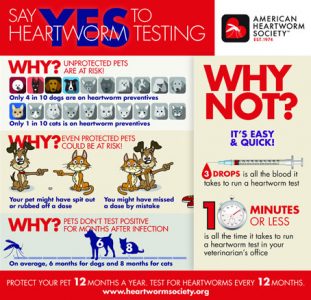by Dr. Sarah Proctor, DVM
 Most dog owners are aware of heartworm disease. Did you know that cats and ferrets can also get it? Let’s talk about how they are alike and how they are different.
Most dog owners are aware of heartworm disease. Did you know that cats and ferrets can also get it? Let’s talk about how they are alike and how they are different.
How do they get it?
Mosquitos transmit heartworm disease to dogs, cats, and ferrets. The disease is more common in the southern US, but even in New England, heartworm is found regularly. There were over 100 cases of heartworm diagnosed in NH dogs last year.
You might think that there is no heartworm risk in the winter, but this past winter is a great example of why that is just not true. Remember those days in February that hit 70 degrees? Mosquitos can become active quickly in warm spells and will put your pets at risk.
You might also think that indoor pets are not at risk, but I’m sure you’ve had mosquitos in your home. If that is true, then even your indoor pet is at risk for heartworm. Granted, the risks are lower for indoor pets and during the winter months, but the disease can be deadly and prevention is very safe and relatively cheap.
What happens to heartworm-infected pets?
If untreated, heartworm infection will eventually kill an infected pet. It may take years and many worms to kill a dog. It takes only one worm to kill a cat or a ferret. Adult heartworms look like spaghetti. Imagine a long strand of spaghetti curled up in your cat’s tiny heart. A few small worms can be lethal in a small animal. In cats, symptoms similar to asthma (coughing, wheezing) can occur. Symptoms of heartworm common to all pets are coughing, vomiting, and lethargy, exercise intolerance.
How can we test pets for heartworm infection?
There is a simple blood test to detect heartworm in dogs. It is usually a part of your dog’s routine yearly check-up. There is a similar test for cats and ferrets but the test is not very accurate in these pets. That’s why many veterinarians don’t test cats or ferrets on a regular basis. Other tests like x-rays and ultrasound may be required to detect heartworm in pets.
If you recently got your dog from a southern US state, you should have them re-tested for heartworm a few months after they arrive in NH. Dogs are required to have a negative heartworm test before being transported to NH, but infections take time to show up on the test. If your pet was infected right before he was transported north, the infection will take several months to show up on a blood test. Talk to your veterinarian to decide if re-testing is right for your pet.
If my pet has a heartworm infection, what can be done?
We can treat heartworm infection in dogs with medication that kills the adult worms. The spaghetti-like worms then die and the dog’s body must break them down and eliminate them. This takes several weeks. During that time, the dog must be kept extremely quiet to prevent stress on the heart.
Cats and ferrets don’t tolerate the same treatment as dogs, due to their small size. Their body doesn’t eliminate the dead adult worms as easily. They mount a severe inflammatory reaction to the dead worms, and that reaction itself can kill your pet. In cats and ferrets, we usually give anti-inflammatory medication until the adult worms die on their own, which can take quite a long time. It is much easier to prevent heartworm than it is to treat an active infection.
How do I prevent heartworm infection in my pet?
For dogs, cats, and ferrets, there is effective and safe preventive medication. There are many products available from your veterinarian. These may be given by mouth or put on the skin. There are many options available and all are quite safe and relatively inexpensive. The American Heartworm Society (https://www.heartwormsociety.org) recommends giving all dogs, cats, and ferrets heartworm prevention all year long. Talk to your veterinarian about what is right for your pet.
